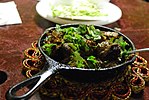|
Hunza diet
The Hunza cuisine, also called the Burusho cuisine (Burushaski: بروشو دݘیرس), consists of a series of selective food and drink intake practiced by the Burusho people (also called the Hunza people) of northern Pakistan. Alternative medicine and natural health advocates have argued without providing any scientific evidence that the Hunza diet can increase longevity to 120 years.[1] The diet mostly consists of raw food including nuts, fresh vegetables, dry vegetables, mint, fruits and seeds added with yogurt. The cooked meal, daal included with chappati, is included for dinner. Longevity mythIn the 1930s, Swiss-German physician Ralph Bircher conducted research on the Hunza diet.[2] In his book about the Hunza, Jay Hoffman argued that, by the ratio to cats, dogs and horses, humans should live up to 120 to 150 years, and argues the Hunza diet to be the key to this longevity.[3] Such ideas also promoted by natural health advocates have been discredited. There is no reliable documentation validating the age of alleged Hunza supercentenarians.[1][4] In 2005, the Encyclopedia of World Geography stated that "to date there is no credible evidence that determines that the Hunzakut diet of old, not to mention the current diet of the past four decades, contributes to longevity."[2] Another myth associated with the Hunza people is that because their diet is alleged to be high in apricot seeds they are free from disease. This has proven to be untrue as medical scientists have found that the Hunzas suffer from a variety of disease including cancer.[1][5] See alsoReferences
Further reading
|
